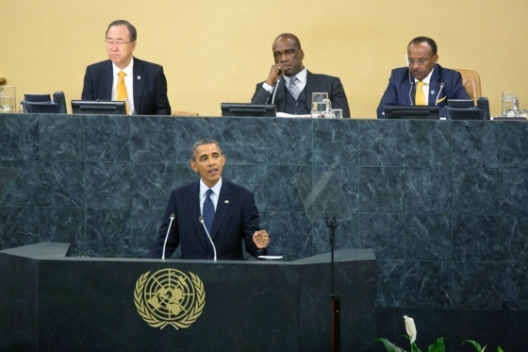 President Obama’s speech at the UN General Assembly (UNGA) on Tuesday was perhaps his most honest—though somewhat disappointing to those wanting the United States to play a vigorous democracy promotion role—account of US policy priorities in the Middle East. Although he mentioned that “it is in our interest to see a Middle East and North Africa that is peaceful and prosperous; and [we] will continue to promote democracy, human rights, and open markets, because we believe these practices achieve peace and prosperity,” it was also abundantly clear that this is not one of the top objectives of his administration. Rather, the president noted that America’s diplomatic efforts will focus on preventing Iran’s acquisition of nuclear weapons and resolving the Israeli-Palestinian conflict.
President Obama’s speech at the UN General Assembly (UNGA) on Tuesday was perhaps his most honest—though somewhat disappointing to those wanting the United States to play a vigorous democracy promotion role—account of US policy priorities in the Middle East. Although he mentioned that “it is in our interest to see a Middle East and North Africa that is peaceful and prosperous; and [we] will continue to promote democracy, human rights, and open markets, because we believe these practices achieve peace and prosperity,” it was also abundantly clear that this is not one of the top objectives of his administration. Rather, the president noted that America’s diplomatic efforts will focus on preventing Iran’s acquisition of nuclear weapons and resolving the Israeli-Palestinian conflict.
How far this is from the soaring rhetoric of Obama’s May 2011 speech, delivered at the State Department in the heady early months of the Arab Awakening, where he stated:
The president’s UNGA speech was far more humble and circumspect about the levers the administration is willing to wield in support of democratic change in the Arab world, and far gloomier about the prospects for democratic transitions there (he described the change in the region as “convulsions” and “hard”). More than opportunity and hope over the long run, he emphasized all the constraints we face in influencing the transitions over the positive impact of coordinated Western support. Indeed, over the past two and half years, the United States has fallen short on Obama’s pledge to make democratic success in the Arab world a top priority. In a new Atlantic Council report, US and EU: Lack of Strategic Vision, Frustrated Efforts Toward the Arab Transitions, we assess US and European Union (EU) efforts to provide assistance over the past year and argue that both the United States and Europe have fallen short on commitments to support the transitioning democracies in Egypt, Libya, Tunisia, and Yemen.
While significant political, economic, and security challenges in these countries over the past year complicated efforts to provide support, the United States and the EU missed important opportunities to capitalize on openings where they existed or to send consistent and sustained diplomatic messages where needed. In the past year, fatigue and frustration more than energy and hope have characterized US and European engagement with these countries.
This is a short-sighted approach, as Egypt, Libya, Tunisia, and Yemen are facing significant challenges in achieving inclusive, democratic, and ultimately stable governing systems. Failure will be catastrophic not only for the region, but also for the long-term interests of transatlantic partners. The best hope for encouraging stable Arab democracies is a reenergized, redesigned strategic approach to support that goal. Obviously, United States and EU cannot generate or ensure democratic transitions in the Arab transitioning countries; that is the task of their own leaders and citizens. But without sustained, effective support from the United States and Europe, these fragile transitions are far less likely to succeed.
Danya Greenfield is the deputy director of the Atlantic Council’s Rafik Hariri Center for the Middle East.
Image: President Barack Obama delivers remarks during his address to the United Nations General Assembly in New York. (Photo: White House)
